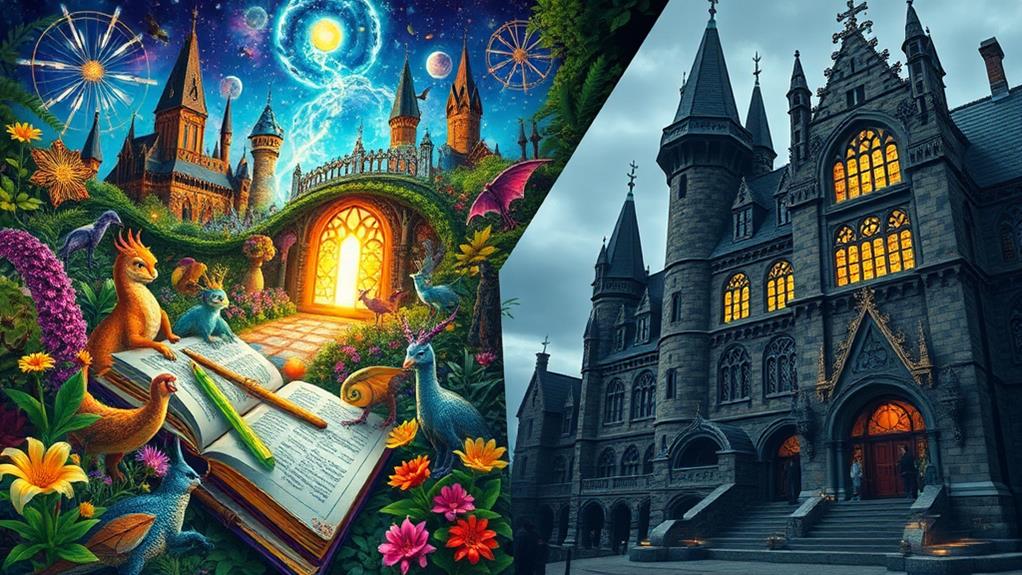
You'll find that magical academies and wizarding schools differ in several key areas. Magical academies have ancient roots, offering a broad, interdisciplinary curriculum that includes both magical and non-magical subjects, fostering well-rounded scholars. Wizarding schools, emerging in medieval Europe, focus narrowly on advanced magical training and defense. Admissions also differ, with academies being more selective, while wizarding schools aim to educate as many magical children as possible. Teaching methods, facilities, and extracurricular activities further distinguish these institutions. Discovering more about these differences can help you appreciate the unique qualities of each magical learning environment.
History and Origins
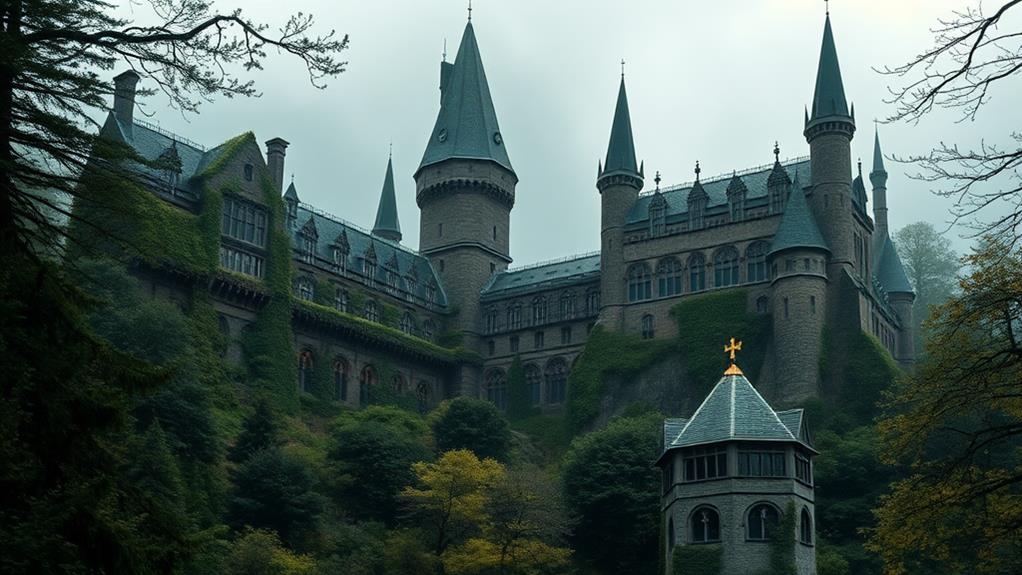
Long before the modern tales of wizardry enchanted our imaginations, magical academies and wizarding schools had already rooted themselves deeply in history. You'd find that these institutions have origins dating back centuries, each with unique cultural and philosophical foundations. Magical academies often emerged in ancient civilizations like Egypt, Greece, and China, where structured mystical studies were integrated with other academic disciplines. These academies aimed to create well-rounded scholars versed in both magic and the natural sciences.
In contrast, wizarding schools came into prominence during the medieval period in Europe. They were often secretive due to the societal fear of witchcraft and persecution. These schools focused more narrowly on magical training, emphasizing practical spellcasting and magical defense to protect against external threats.
You'll notice that while magical academies leaned toward a holistic education, wizarding schools were more insular, safeguarding their students from the outside world. This divergence in their origins has led to distinct traditions and teaching methodologies. By understanding these historical roots, you can better grasp why magical academies and wizarding schools evolved along different paths, each shaping the wizards and witches who passed through their doors.
Curriculum Differences
The curriculum differences between magical academies and wizarding schools reflect their distinct educational philosophies. In a magical academy, you'll find a broad, interdisciplinary approach. These institutions emphasize a well-rounded education, mixing magical theory with practical applications and even non-magical subjects. For example, you might study magical history alongside physics or literature. This approach aims to create versatile spellcasters who can adapt to various challenges.
Wizarding schools, on the other hand, usually focus more narrowly on magical studies. Their curriculum is steeped in tradition, often emphasizing mastery of specific magical disciplines. You’ll spend significant time on potion-making, spell-casting, and magical creature care. The goal here is to produce specialists with deep expertise in their chosen fields. In addition to the core subjects, the curriculum of wizarding schools may also include practical experiences, such as field trips to magical locations or internships with renowned witches and wizards. Students are encouraged to participate in hands-on activities, allowing them to apply their knowledge in real-world situations. This immersive approach not only hones their skills but also fosters a sense of community among aspiring wizards and witches.
Another key difference lies in elective courses. Magical academies offer a wide range of electives, encouraging you to explore different magical and non-magical interests. Wizarding schools often provide fewer electives but offer more advanced coursework in specialized subjects. This allows you to dive deeply into areas like dark arts defense or advanced alchemy.
Teaching Methods
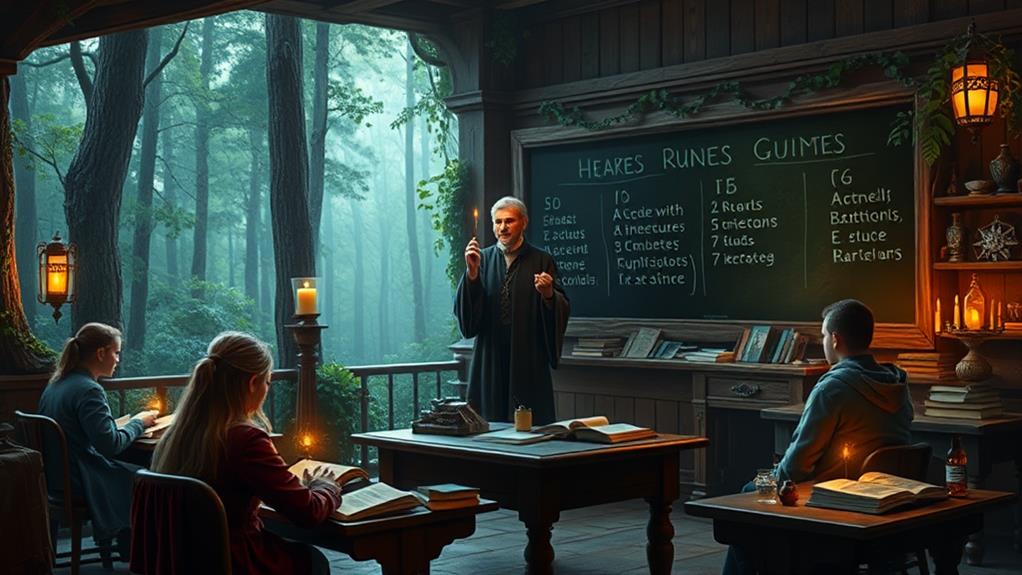
Teaching methods in magical academies and wizarding schools diverge substantially, reflecting their unique philosophies. In magical academies, you'll find a more structured, academic approach. These institutions emphasize theoretical knowledge, often requiring rigorous study and written examinations. In contrast, wizarding schools prioritize hands-on learning, encouraging students to practice spells and potions in real-time scenarios. This distinction raises an interesting question: do wizards require a wand to master their craft, or can innate magical ability suffice? While magical academies might delve into such debates through scholarly analysis, wizarding schools often explore the answer experientially by allowing students to try spellcasting with and without a wand. The contrasting methods ultimately shape how young magic users grow and understand their abilities.
Here's how the teaching methods vary:
- Lectures vs. Workshops: Magical academies rely heavily on lectures and textbooks, ensuring you master the theory before application. Wizarding schools, however, favor interactive workshops where you can immediately put theory into practice.
- Assessment Styles: At magical academies, assessments are often written tests and research papers. Wizarding schools use practical exams and demonstrations, letting you showcase your skills in a controlled environment.
- Classroom Environment: Magical academies maintain formal classrooms with strict schedules. You'll follow a set curriculum designed to cover extensive theoretical knowledge. Wizarding schools offer a more flexible learning environment, adapting lessons to real-world magical challenges you might encounter.
These divergent teaching methods shape how you learn and apply magic, molding future magicians and wizards in distinct ways.
Student Selection
Finding the right students is paramount for both magical academies and wizarding schools, but their selection processes couldn't be more different. In a wizarding school, the process often starts with an inherent magical ability. If you're born with magic, you're likely to receive an invitation. The focus is on discovering latent talent in young witches and wizards, ensuring that every magical child has the opportunity to learn and grow.
Magical academies, however, take a more holistic approach. They don't just look at innate abilities; they consider a range of factors including character, intellect, and potential for growth. You might undergo a series of rigorous tests, interviews, and even magical challenges. The aim is to assess your overall suitability for advanced magical training, not just your existing skills.
Additionally, wizarding schools tend to have a more inclusive policy, aiming to educate as many young magical beings as possible. In contrast, magical academies often have limited spots and are highly selective, seeking only those who meet their stringent criteria. This difference in selection reflects the broader goals and philosophies of these institutions, shaping the kind of magic users they produce.
Magical Creatures
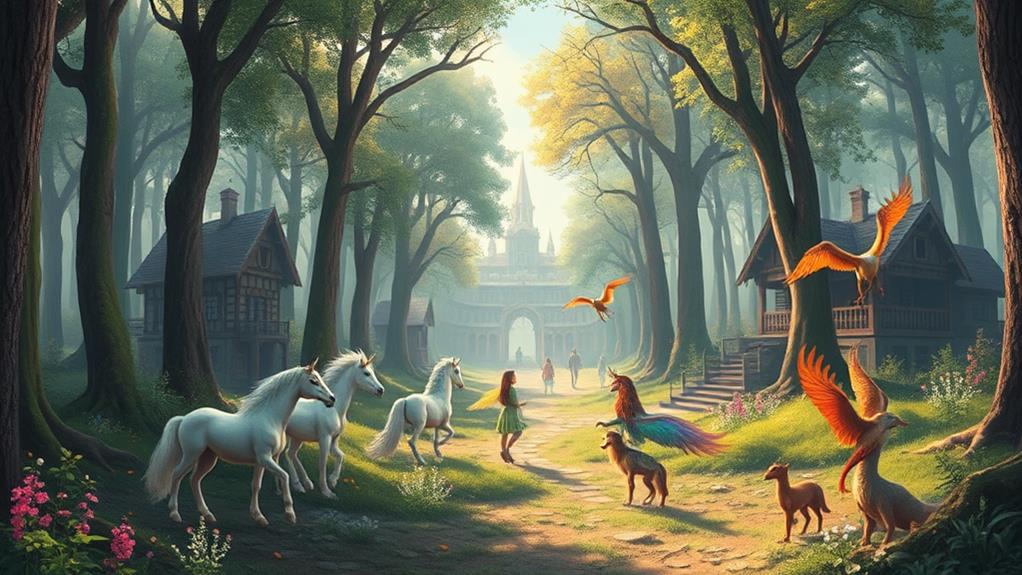
While the selection process shapes the student body, the presence and study of magical creatures add another layer of complexity to both magical academies and wizarding schools. You'll find that magical academies often emphasize a more theoretical understanding of these creatures. They prioritize research and the ethical implications of interacting with them. This approach encourages students to think critically about their magical environment.
Wizarding schools, on the other hand, usually adopt a more hands-on approach. You might find yourself in a Care of Magical Creatures class, learning how to handle Nifflers or bow to Hippogriffs. This practical experience is invaluable, but it's often less structured than the academic rigor you'd encounter in a magical academy.
Here's a closer look at how magical creatures are incorporated:
- Curriculum Focus: Magical academies integrate magical creatures into broader subjects like Magical Ecology, while wizarding schools offer specific classes centered on creature care.
- Interaction Level: You'll notice magical academies might limit direct interaction, focusing on observation, whereas wizarding schools encourage hands-on experiences.
- Research Opportunities: Academies often provide extensive research projects involving magical creatures, whereas wizarding schools may offer fewer but more practical opportunities.
This distinction in approach shapes how you'll interact with the magical world around you.
Facilities and Resources
Accessing the right facilities and resources can make a significant difference in your magical education. In magical academies, you'll find state-of-the-art alchemy labs and enchanted libraries equipped with rare and ancient tomes. These institutions prioritize a blend of traditional and modern magical practices, ensuring you have access to cutting-edge spellcasting tools and resources that aren't commonly found in wizarding schools.
Wizarding schools, on the other hand, often emphasize historical continuity and tradition. They might lack the latest innovations but offer robust, time-tested magical artifacts. For instance, a wizarding school's potions lab may be filled with centuries-old cauldrons that have been used by generations of students, adding a layer of heritage to your learning experience.
| Magical Academies | Wizarding Schools |
|---|---|
| Modern alchemy labs with advanced equipment | Traditional potions labs with historical artifacts |
| Libraries with rare, enchanted tomes | Libraries with extensive historical collections |
| Cutting-edge spellcasting tools | Time-tested magical artifacts |
Both approaches have their merits. In a magical academy, you'll benefit from the latest technological advancements in magic, while in a wizarding school, you'll gain a deep appreciation for the historical roots of your craft. Ultimately, your choice will depend on whether you prioritize innovation or tradition in your magical education.
Extracurricular Activities
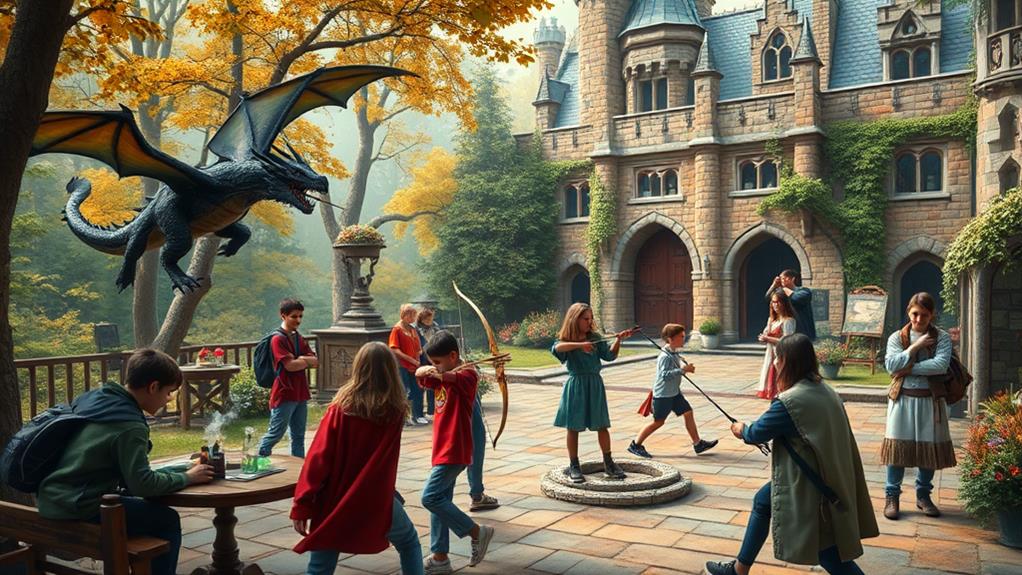
When it comes to extracurricular activities, magical academies and wizarding schools offer distinct experiences that cater to different interests. In magical academies, you'll often find a broader range of activities designed to enhance both magical and non-magical skills. These institutions focus on creating well-rounded individuals who can excel in various fields.
- Magical Competitions: Magical academies frequently host events like potion-making contests, spell-casting duels, and enchanted creature care tournaments. These competitions not only test your skills but also foster camaraderie and healthy rivalry among students.
- Creative Arts: Many magical academies emphasize the importance of the arts. You might participate in enchanted theater productions, magical painting classes, or even spell-infused music ensembles. These activities allow you to express your creativity in unique and magical ways.
- Community Service: Unlike wizarding schools, magical academies often have a strong focus on community involvement. You could engage in projects like magical wildlife conservation, healing clinics, or enchanted garden initiatives. These activities aim to make a positive impact both within and outside the magical community.
In contrast, wizarding schools typically concentrate on traditional wizarding sports like Quidditch and dueling clubs. While these are thrilling and competitive, they may not offer the same diversity of experiences found in magical academies.
Staff and Faculty
The staff and faculty at magical academies and wizarding schools play a crucial role in shaping the educational experience. In magical academies, you'll find instructors who often specialize in a wide array of magical disciplines, from elemental manipulation to ancient runes. These educators tend to have a more academic approach, emphasizing theoretical knowledge alongside practical application. They often hold advanced degrees and have extensive research backgrounds, ensuring that you're learning from the best in the field.
Wizarding schools, on the other hand, typically feature faculty who are more practice-oriented. They've usually spent years in active magical roles, such as aurors, potion masters, or magical creature handlers. Their experience in real-world magical scenarios brings a hands-on approach to the classroom, allowing you to gain skills that are immediately applicable outside the school environment.
Moreover, magical academies often have a more formal structure, with professors holding office hours and adhering to strict academic guidelines. Wizarding schools, however, might offer a more relaxed atmosphere, where teachers are approachable mentors who provide guidance both inside and outside the classroom. This difference in staff and faculty influences not just what you learn, but how you learn it.
Cultural Influences
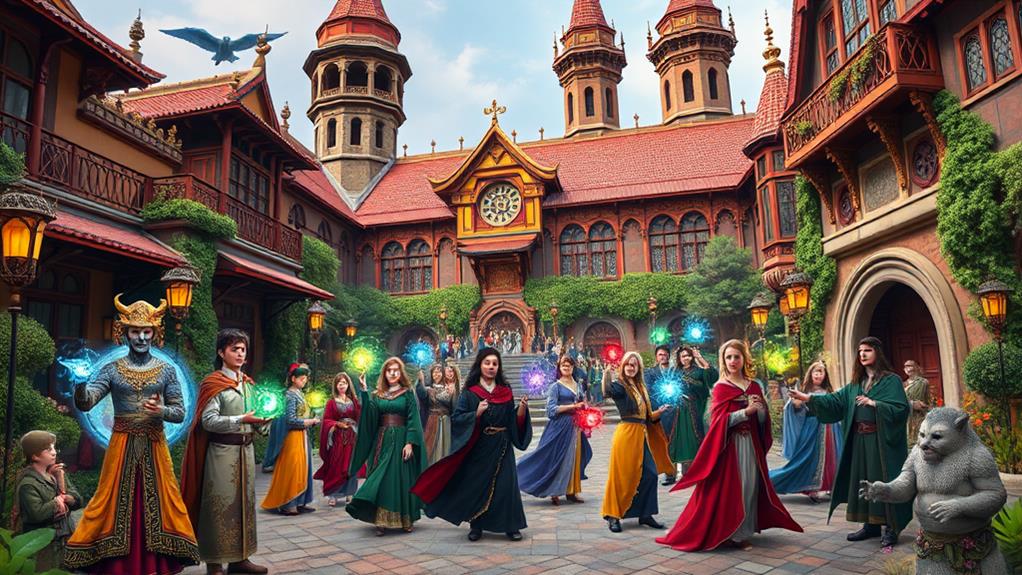
Although magical academies and wizarding schools both cultivate environments steeped in tradition and lore, their cultural influences diverge substantially. In magical academies, you'll often find that the curriculum draws from a diverse array of global magical practices. This diversity enriches the learning experience, exposing students to a wider spectrum of magical traditions and spells. In contrast, wizarding schools tend to focus more narrowly on the magical culture and practices specific to their region, fostering a deep-rooted sense of local identity and heritage.
Cultural influences in magical academies emphasize inclusivity and global awareness. These institutions often celebrate various magical festivals from around the world, bringing students together to learn and appreciate different magical traditions. Here are three key differences:
- Global Curriculum: Magical academies incorporate teachings from multiple cultures, whereas wizarding schools focus on regional magic.
- Festivals and Celebrations: You'll see a broader range of magical holidays celebrated at academies, fostering a global community spirit.
- Language and Rituals: Academies often teach spells in various languages and incorporate diverse rituals, while wizarding schools stick to their native traditions.
At a Glance
As you wander through the enchanted halls of a magical academy, you can almost hear the whispers of ancient spells and feel the pulse of diverse teachings. Unlike the structured corridors of wizarding schools, these institutions brim with mystical creatures, eclectic curricula, and rich cultural tapestries. Whether you're traversing a maze of rare spellbooks or attending a class led by a centaur, the experience is uniquely immersive, making magical academies a domain of endless wonder and discovery.






